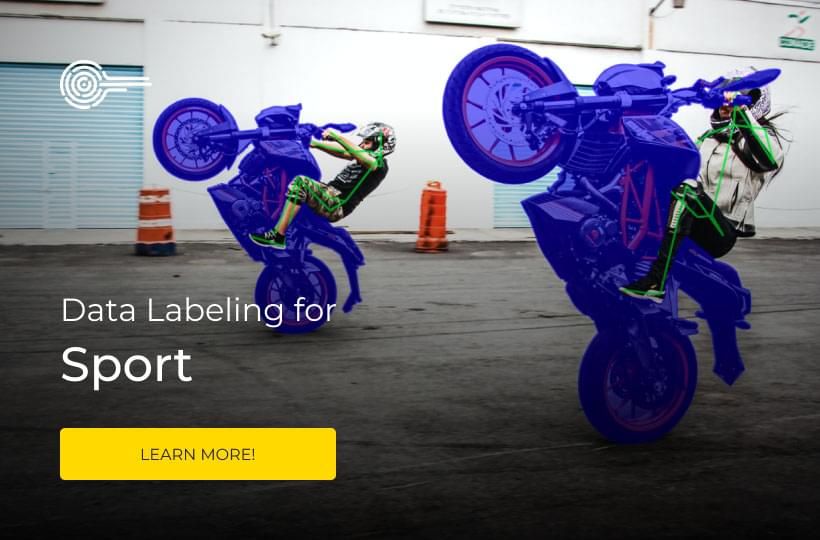Five Uses for AI and Data Annotation in Sports

The sports industry is changing quickly. New technologies are taking center stage and transforming how players and teams interact. Artificial intelligence will play a central role in this transformation. From analytics to predictions, data-driven sports is no longer a thing of the future. Athletes will be able to take their game to the next level.
AI will mean different things to different groups in sports. Coaches can plan strategies for the teams and players in more data-focused ways. Players can monitor their health and performance more precisely. Fans can gain new levels of understanding of how their favorite teams are doing. The act of performing and watching sports will become more interactive, more responsive, and maybe more fun.
How AI can be used in sports
At the end of the day, every AI system needs to transform data into actionable predictions. The use of data in sports has been growing in recent years. Data can help fans keep up with their favorite players or coaches design better plays. There is a suite of tools emerging which can make for more effective athletes.
It is not infeasible to imagine a world in which all professional sports teams have data analysts and machine learning engineers on staff. The competitive advantage of data-based strategies could mean the difference between a win or loss. Most sports teams or athletes are major businesses with strong financial backing. AI in the sports world will likely look a lot like AI in the business world. If you're not already using it, you're already late!
Video annotation | Keymakr
Five uses for AI in sports
There are many specific use cases for artificial intelligence in sports. Generally, these can be broken down into a few different categories:
1. Player Analytics
2. Team Strategy
3. Statistics/Predictions
4. Health/Wellness
5. Spectator Experience
Player analytics pertains to team leaders (coaches, trainers) and players. Better strategies can be implemented using data about success and failure in games or matches. The data that could work as inputs there are numerous. Maybe a player does better in the first half of games. Or on days when weather conditions are better. AI-backed player analytics can identify these trends and suggest new training regimes.
Aggregating these player-specific analytics can help teams better design their strategies as well. Depending on the sport, AI can be used to simulate the potential actions of competitors. Training datasets can take previous game patterns and project them onto future conditions. Video data annotation for sports teams also means that these strategies can come from real-life recordings of previous games.
Statistics and predictions can augment the experience of teams and players together. Sports betting is a multi-billion dollar industry that makes use of fan intuition. Although many make bets based on a gut feeling, robust AI systems could transform how it's done. This is already in use in the betting industry, with many platforms offering a huge number of stats to users. AI will provide new insights into what that data can mean.
Player health and wellness is a major focus of every modern sports team. Injured players can be costly, lower team morale, and upset fans. AI-based health solutions can help ensure that players can stay playing. With the rise of "quantified self" accessories (armbands, watches), new kinds of annotated data can be used in this. Instead of "fixing" players when they get hurt, injuries can be avoided before they ever happen.
Lastly, AI has the potential to improve the spectator experience dramatically. We've seen this in the NFL with the imaginary "line of scrimmage" that can be placed on live video footage of the field. Professional sports often come down to small, very quick actions in the game. Using AI to determine if the ball was in or if the move was legal can get viewers much more engaged.
There are other, more specific use cases for AI. Referees are already using video analysis AI systems to make better calls. Ticket pricing algorithms allow more people to fill the stadiums and teams to make more money. Media companies can use big data to find new international broadcast markets. Sports entertainment is a huge industry with a lot to gain from AI.

What AI means for the future of sports
A world in which every sports team uses advanced AI and ML algorithms will likely look different than today. What might happen when an AI strategy goes up against another AI strategy? Will an arms race exist to see which team can make the better AI? Maybe it'll go to the one that can pay the most? Because there are so many different types of data annotation that might be used to create these algorithms, the possibilities for what they will do are almost endless.
These are all real questions that will likely become central to the world of sports in the future. And these changes are already happening. The world of sports has always been skewed in favor of whichever team or player could think most strategically. AI has opened up an entirely new playing field for how that can be done.
The future of AI in sports will also likely be healthier and safer. Predictions about hazards and potential injuries could really change how players stay healthy. Sports can also become more entertaining. Media is already one of the driving forces behind AI adoption. Interactive and compelling sports broadcasts will surely follow this.
Sports is almost certainly an area to watch as AI becomes more and more central to its processes. These teams are heavily funded businesses with typically young and savvy staffing. As a result, the sports industry might become one of the driving forces for how AI is integrated into our entertainment and our lives in the future.



